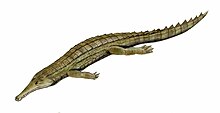Elosuchus
| Elosuchus Temporal range: | |
|---|---|

| |
| Skull of E. cherifiensis | |
| Scientific classification | |
| Domain: | Eukaryota |
| Kingdom: | Animalia |
| Phylum: | Chordata |
| Class: | Reptilia |
| Clade: | Archosauria |
| Clade: | Pseudosuchia |
| Clade: | Crocodylomorpha |
| Clade: | Crocodyliformes |
| Family: | †Pholidosauridae |
| Genus: | †Elosuchus de Broin, 2002 |
| Species | |
| |
Elosuchus is an extinct genus of neosuchian crocodyliform that lived during the Middle Cretaceous of what is now Africa (Niger, Morocco and Algeria).
Description and taxonomy
Elosuchus had an elongated snout like a gharial and was probably a fully aquatic animal. The type species, E. cherifiensis from Algeria and Morocco, was originally described as a species of Thoracosaurus by Lavocat,[2] but was recognized as a genus separate from Thoracosaurus by de Broin in 2002. Elosuchus felixi, described from the Echkar Formation of Niger, was renamed Fortignathus in 2016 and is either a dyrosaurid relative or a non-hyposaurine dyrosaurid.[3][4] The largest known skull indicates a body length of up to 7.7 metres (25 ft 3 in).[1]
Phylogeny

de Broin (2002) created the family Elosuchidae to contain Elosuchus and the genus Stolokrosuchus from Niger.[3] However, recent phylogenetic analyses usually find Stolokrosuchus to be one of the basalmost neosuchian, only distantly related to Elosuchus.[5][6][7][8] Some analyses find a monophyletic Pholidosauridae that includes Elosuchus,[7] while other analyses find Elosuchus to nest with taxa like Sarcosuchus in a clade as a sister-taxon to the node Dyrosauridae+Pholidosauridae.[6][8]
References
- ^ a b Louise M. V. Meunier; Hans C. E. Larsson (2016). "Revision and phylogenetic affinities of Elosuchus (Crocodyliformes)". Zoological Journal of the Linnean Society. 179 (1): 169–200. doi:10.1111/zoj.12448.
- ^ Lavocat, R., 1955, Decouverte d'un Crocodilien du genre Thoracosaurus dans le Cretace Superiuer d'Afrique: Bulletin du Museum National d'Historie Naturelle, Paris, v. 2, n. 27, p. 338-340.
- ^ a b de Broin, F. de L., 2002, Elosuchus, a new genus of crocodile from the Lower Cretaceous of the North of Africa: C. R. Palevol, v. 1, p. 275-285.
- ^ Mark T. Young; Alexander K. Hastings; Ronan Allain; Thomas J. Smith (2016). "Revision of the enigmatic crocodyliform Elosuchus felixi de Lapparent de Broin, 2002 from the Lower–Upper Cretaceous boundary of Niger: potential evidence for an early origin of the clade Dyrosauridae". Zoological Journal of the Linnean Society. Online edition. doi:10.1111/zoj.12452.
- ^ Turner, Alan H.; Sertich, Joseph J. W. (2010). "Phylogenetic history of Simosuchus clarki (Crocodyliformes: Notosuchia) from the Late Cretaceous of Madagascar". Journal of Vertebrate Paleontology. 30 (6, Memoir 10): 177–236. doi:10.1080/02724634.2010.532348. S2CID 86737170.
- ^ a b Marco Brandalise de Andrade; Richard Edmonds; Michael J. Benton; Remmert Schouten (2011). "A new Berriasian species of Goniopholis (Mesoeucrocodylia, Neosuchia) from England, and a review of the genus". Zoological Journal of the Linnean Society. 163 (s1): S66–S108. doi:10.1111/j.1096-3642.2011.00709.x.
- ^ a b Daniel Fortier; Daniel Perea; Cesar Schultz (2011). "Redescription and phylogenetic relationships of Meridiosaurus vallisparadisi, a pholidosaurid from the Late Jurassic of Uruguay". Zoological Journal of the Linnean Society. 163 (s1): S66–S108. doi:10.1111/j.1096-3642.2011.00722.x.
- ^ a b Bronzati, M.; Montefeltro, F. C.; Langer, M. C. (2012). "A species-level supertree of Crocodyliformes". Historical Biology. 24 (6): 598–606. doi:10.1080/08912963.2012.662680. S2CID 53412111.



